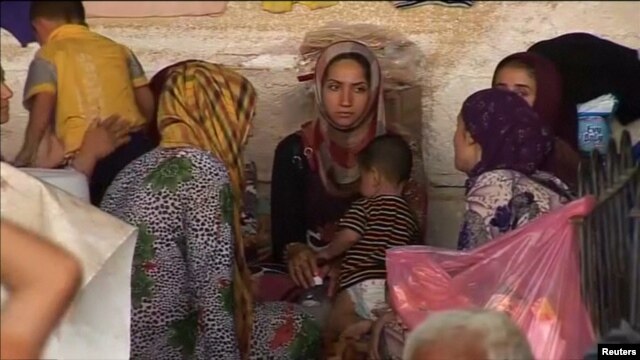New U.S. aid drop amid fresh air strikes in northern Iraq
| Publisher | Radio Free Europe/Radio Liberty |
| Publication Date | 9 August 2014 |
| Cite as | Radio Free Europe/Radio Liberty, New U.S. aid drop amid fresh air strikes in northern Iraq, 9 August 2014, available at: https://www.refworld.org/docid/54003ebd3.html [accessed 21 May 2023] |
| Disclaimer | This is not a UNHCR publication. UNHCR is not responsible for, nor does it necessarily endorse, its content. Any views expressed are solely those of the author or publisher and do not necessarily reflect those of UNHCR, the United Nations or its Member States. |
August 09, 2014
By RFE/RL
 In a capture from Reuters video, Shi'ite Turkomans in Iraq flee fighting after their town was captured by the Islamic militants who call themselves the Islamic State (formerly ISIL/ISIS).
In a capture from Reuters video, Shi'ite Turkomans in Iraq flee fighting after their town was captured by the Islamic militants who call themselves the Islamic State (formerly ISIL/ISIS).
The United States has conducted its second air drop of food and water to thousands of Iraqis hiding in mountains from Islamist militants.
It came hours after U.S. forces have launched a second wave of air strikes against Islamic State (IS) in northern Iraq.
The Pentagon said the latest air drop on August 9 dispersed a total of 72 bundles of supplies, delivered by
The Pentagon earlier said fresh air strikes included a drone strike on a mortar position and an attack by four jets on an IS convoy and mortar position near the city of Arbil – a similar location to a first strike earlier on August 8.
President Barack Obama has authorized air strikes on Iraq to protect U.S. military and diplomatic personnel in Irbil and prevent "a potential act of genocide" against religious minorities.
The IS militants regard the tiny Yazidi minority and even Shi'a Muslims as heretical and have executed them in large numbers. Hundreds of Yazidi women have been taken captive.
Thousands of Yazidis were encircled in northern Iraq, prompting the United States to carry out the humanitarian air drops to the refugees fleeing their homes to Mount Sinjar.
Washington again urged officials in Baghdad to resolve their stalemate over a prime minister, a situation that many observers see as hindering Iraq's ability to mount an effective front against the Islamic State fighters, who have conducted large numbers of executions as they have asserted control over major swaths of the country.
U.S. Vice President Joe Biden phoned Iraqi President Fuad Masum on August 8 to discuss U.S. military strikes against the jihadist fighters.
"The vice president emphasized the threat ISIL presented to all Iraqis and affirmed the U.S. commitment to support Iraq and all of its citizens – from north to south - as they work to defend the country against this international threat," the White House said in a statement.
The British Foreign Office said that country would also be airdropping food aid to the refugees sometime in "the next couple of days."
After seizing Iraq's second-largest city Mosul in June, the Islamic State, then known as the Islamic State in Iraq and the Levant (ISIL/ISIS), advanced across the north, pushing back Kurdish forces and coming within 60 kilometers of Irbil.
On August 7, the group said it had seized 17 Iraqi cities, towns, and targets – including a dam and a military base – over the previous five days, including Qaraqoush, the largest Christian town in Iraq.
Based on reporting by Reuters, AFP, and AP
Link to original story on RFE/RL website
